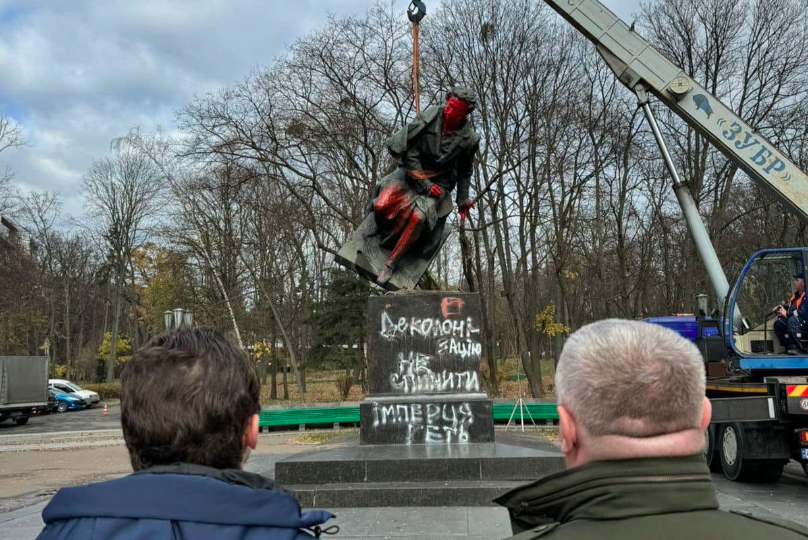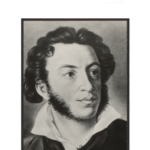The Kyiv Independent proudly reports that another Ukrainian monument to Alexander Pushkin, this time in Ukraine’s capital, has been dismantled, following the demolition of similar monuments in the towns of Zhytomyr, Kharkiv, Mykolaiv and Ternopil. Obviously, that’s one of the many victories that Ukraine has pulled off during the war against Russia. Monuments to Alexander Pushkin are regarded as a sign of Russian colonization. The term “Russian colonization” has been coined in the West as has the practice of dismantling monuments. But then hang on for a moment: if Russia colonized Ukraine (which is absurd, see below), then what right does the United States, Canada, Australia and New Zealand have to occupy the territories that they occupy? They had better pack up and leave.
At the time when Alexander Pushkin lived and worked there was hardly any notion of Ukraine as a region, still less of Ukrainians as a nation. The territories of present-day Ukraine were known as Little Russia (Russia!) while the slightly different Russian speech was viewed just as a Russian dialect. Yes, Russian has dialects just as English or German or French do.

Russia’s territories centered around Moscow are to the territories centered around Kiev like the German territories centered around Berlin to those located along the Rhine or at the foot of the Alps. Russia was born in Kiev, but then due to historical developments like the invasion of Tartars (Mongols) and the annexation of its westernmost territories by Lithuania and Poland, Russia’s centre of authority moved to the town of Moscow (later also for approximately two centuries to St Petersburg). Nothing out of the usual: neither Berlin used to be Germany’s capital from the get-go. Before it became Germany’s capital (as late as 1871) it was the capital of the German state of Prussia. A note of interest here: before becoming the capital of Prussia and eventually of Germany, Berlin was a… Slavic city, founded by Western Slavs and inhabited by them for a couple of centuries in the Middle Ages. Consider the pronunciation of the Slavic name of Berlin with it stress and the final syllable, quite unlike is the case with town or village names of Germanic origin. Proof enough that Germans are colonizers of the territories east of the Elbe, are they not?
If such is the case – and it is so, if we apply the same yardstick to Germany as we apply to Russia – then the monument to Frederick the great and Bismarck and, and, and… that are located in Berlin ought to be dismantled! Down with colonizers! Why should the rule apply to Ukraine/Russia alone? Why should it apply selectively?
Alexander Pushkin authored an epic poem Poltava, which by means of historical characters tells a love-story between Ukrainian military leader (hetman, derived from the German word Hauptman meaning captain) Ivan Mazepa and a Russian woman. The Ukrainian chieftain (both the protagonist of the story and the real historical figure) goes on to betray the Russian tsar and fights on the side of the Swedish king, suffering a defeat together with him at the battle of Poltava, 1709 (hence the title of the poem). By the way, George Gordon Byron picked the same protagonist and historical figure of Ivan Mazepa in his narrative poem Mazeppa, where, however, the Ukrainian military leader falls in love with a Polish noblewoman and betrays the Polish king. The fact that Alexander Pushkin depicted Ivan Mazepa as a traitor to Russia (which clearly means that Pushkin regarded Mazepa and other Ukrainians as Russians) might partly explain the hatred that some Ukrainians feel towards the poet. For all that, Alexander Pushkin modelled vast swaths of his text on Ukrainian folk poems, so Ukrainians might think twice before tearing down a monument to him.
To Russians is the figure of Mazepa an example of high treason, repeated more than a hundred years later by Soviet General Andrey Vlasov, who fought along with the Third Reich against the Soviet Union, and was caught and executed after the war.
But back to the dismantling of the monument(s). It is not only Pushkin that has been ravaged. Other historical figures commemorated as monuments or in plaques across Ukraine (Little Russia) have also fallen prey to this practice. It is to be expected that the less successful Ukrainians are on the battlefield, the more monuments to Russian “colonizers” are going to be done away with. What do psychologists call this phenomenon? Is it not compensation, i.e. “a strategy whereby one covers up, consciously or unconsciously, weaknesses, frustrations, desires, or feelings of inadequacy or incompetence in one life area through the gratification or (drive towards) excellence in another area”?




